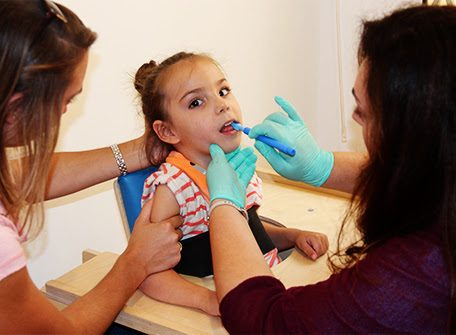Feeding therapy aims to assist patients in establishing normal, functional feeding patterns and behaviours.
What is the Definition of Feeding Therapy?
It’s more than just “training a child to eat” when it comes to feeding therapy. Therapists collaborate closely with patients and their families to identify the source of a child’s issues and build highly customised therapies to make the entire eating experience smoother and more joyful.
When is it Appropriate to Refer a Child for Feeding Therapy?
Mealtimes are a wonderful time for bonding and experiencing new things. Unfortunately, it may be a stressful and difficult time for some children. If any of the behaviours listed below are interfering with a child’s ability to eat safely, achieve nutritional needs, or enjoy the mealtime experience, pediatric feeding therapy may be beneficial.
- Difficulty in chewing food, and it is usually swallowed whole.
- Food swallowing difficulties or a refusal to swallow specific types of food with consistency.
- Refuses to eat specific textures of food or finds it difficult to shift from one texture to another (for example, from bottle feedings to purees, from purees to soft solids or mixed textured foods).
- Certain food textures, temperatures, and/or flavours make him gag, avoid them, or make him extremely sensitive to them.
- Struggles with controlling and coordinating food movement in the mouth, chewing, and swallowing.
- Feeding makes your child fussy or irritated.
- During or after feedings, the infant appears to be congested.
- Coughs a lot while eating.
- When eating, you see your child often gags and chokes.
- Vomits frequently while or shortly after eating or drinking.
- Refuses to try new foods or only does it sometimes.
- Food is pushed away.
What Skills are Taught in Feeding Therapy?
Feeding therapy involves therapists working with children to teach them the skills they need to make mealtimes more fun and nutritious. Each child’s skills are defined by the patient’s demands and may differ from those listed below. The following are the most commonly taught skills:
Oral Skills
Due to developmental delays, illness, allergies, and a variety of other causes, some children may lack the abilities required to eat and/or drink. When this is the case, therapists work with patients to teach them how to manage and synchronise their chewing, sipping, sucking, swallowing, and other eating and drinking activities. Patients’ oral strength and range of motion are also improved with the help of therapists.
Food Orientation
Some children may require support in increasing the amount and variety of meals they eat due to illness, allergies, sensory aversion, or developmental delays. This is critical because it will enable the youngster to enjoy meals more and consume a more balanced, healthy diet. Occupational therapists work with patients and their families to enhance the amount and variety of meals that the kid will eat. Many patients, particularly those with sensory aversion or limited exposure to a variety of foods, may be taught methods to help them minimise their food and texture sensitivities.
Enhance the Eating Experience in General
Whether a child has struggled to eat due to illness or allergies, a sensory aversion to food, or a lack of oral skills, he or she may have formed negative sentiments toward eating and mealtime as a result of the experience. As a result, learning how to create happy eating and drinking experiences benefits many children and their families.
Occupational therapists work with patients and their families to improve the child’s overall mealtime routine and establish good food associations. Therapists also teach patients skills like drinking from a cup, eating with a spoon or fork, and drinking through a straw to help them acquire the self-feeding independence that many of them desire. Meals and snacks may become easier for the entire family if the child is taught to appreciate mealtime and the child’s caregiver is retrained on how to create a positive mealtime experience.
What Role do Pediatric Feeding Therapy Specialists Play?
They play an important role in feeding therapy. They stay in close contact with the parents and guardians of the child in between appointments and the therapy. If necessary, strategies for pediatric feeding therapy can be changed.
At Hope-AMC, a Dubai-based centre for paediatric feeding disorders treatment, we strive to improve the following behaviours and characteristics in children:
- Working towards making the muscles of the mouth of children stronger
- Strong muscles are necessary to chew and swallow food particles properly
- Help children to learn how to increase tongue movement
- Increase acceptance of different foods and liquids
- Improve sucking and or drinking ability
- Coordinate the suck-swallow-breath pattern
- Change food textures and liquid thickness to ensure safe swallowing
We provide paediatric nutrition therapy at Hope. We have a professional team of Paediatric Speech and Language therapists that will work with your kid to overcome any deficits or challenges in eating and swallowing while ensuring that everything is done safely so that your child gets the most benefit from the paediatric feeding therapy.


